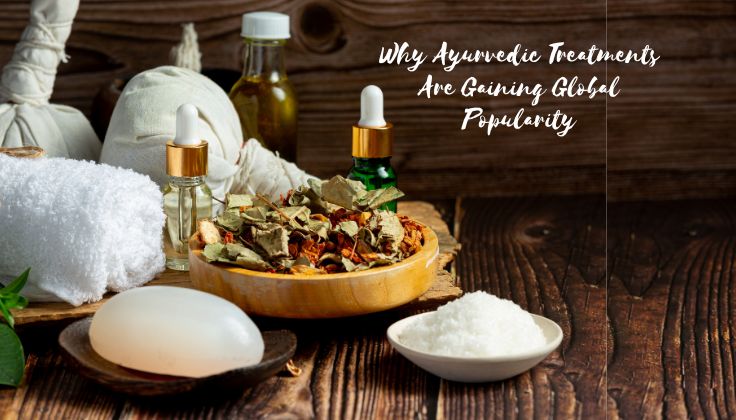


When you search for “Ayurvedic treatment in Dubai,” you’ll find that more clinics are offering services rooted in the ancient system of health known as Ayurveda. What this really means is that a system developed over 3,000 years ago is now finding relevance far beyond its original home. For providers such as Ayurheritage Clinic, this is a timely opportunity to connect with an international audience, offer meaningful care, and meet the rising demand for holistic wellness.
Let’s look at.
One of the key reasons people are turning to Ayurveda is the emphasis on prevention and balance instead of only responding to symptoms. Ayurveda teaches that each person has a unique constitution (“dosha”) and that health is not actually just the absence of disease but the beautiful functioning of body, mind, and environment.
In simple words, when modern healthcare focuses on diagnosing and treating, Ayurveda emphasises living well and staying well. That approach appeals especially to people dealing with lifestyle-related conditions or wanting a deeper personal health strategy.
The global market for Ayurveda is growing significantly. For example, the global Ayurveda market was valued at approximately USD 17.15 billion in 2024 and is projected to expand to USD 85.83 billion by 2033, registering a compound annual growth rate (CAGR) of 19.66% between 2025 and 2033 (ref).
What this means in practice is that Ayurveda is not just a niche, it’s being recognised, commercialised, and integrated into wellness systems worldwide. That trend encourages clinics, wellness centres, and healthcare systems to include Ayurvedic treatments alongside conventional care.
Many people today are seeking alternatives to synthetic medicines, long lists of side effects, and treatments that don’t feel personalised. Ayurveda’s use of herbs, oils, diet, lifestyle modifications, and therapies offers an attractive counterpoint.
In addition, its emphasis on treating the root cause rather than just masking symptoms aligns with how many individuals think about health today. In other words, instead of just “fixing the problem,” you work with the body’s own systems to restore balance.
While Ayurveda’s origins are traditional, research efforts are increasing. There are articles showing how Ayurvedic methods help where modern treatments struggle, especially with chronic conditions. Moreover, awareness in Western countries and non-Asian markets is growing. The basic theory of Ayurveda is becoming better understood. This rising acceptance helps fringe concepts become mainstream and gives more people confidence to try them.
As global mobility increases, people travel not just for business or leisure but also for health and wellness. Cities like Dubai are emerging as hubs for international patients, and Ayurvedic services in such locations are increasingly in demand. People are looking for trusted clinics that can provide authentic treatments combined with professional care standards, making wellness tourism a growing sector.
When you consider Ayurvedic treatment in Dubai, you are looking at an environment where high standards of service, international clientele, and the infrastructure for holistic care all converge. Patients often prefer destinations that can offer both effective treatment and a comfortable, supportive experience, which is why Dubai has become a preferred choice for wellness seekers.
Clinics such as Ayurheritage Clinic can position themselves effectively for both locals and visiting patients by offering tailored programs, personalized care, and therapies backed by traditional wisdom. This approach not only attracts international clients but also helps build trust among residents seeking a reliable path to holistic well-being, reinforcing Dubai’s reputation as a leading wellness destination.
Another factor is that Ayurveda isn’t being used solely on its own. Often it’s offered as a complementary approach alongside modern medicine and wellness therapies. Because of that, more people find the transition easier and more acceptable. Clinics that structure programs combining diagnostics, Ayurvedic therapies and lifestyle counselling stand a better chance of meeting modern expectations without compromising traditional authenticity.
Finally, Ayurveda holds a philosophical dimension that many patients find meaningful. It isn’t just about pills and procedures, it’s about lifestyle, connection, rhythm and balance. For many people seeking depth in their wellness journey, this is important.
For providers: There’s a genuine opportunity in offering Ayurvedic services in international markets, but it’s essential to maintain authenticity, qualified practitioners, and transparent outcomes.
For patients: Choosing Ayurvedic treatment means committing to the process, lifestyle change, and tailored care, not just a generic solution.
To conclude, the rise of Ayurveda globally reflects more than a trend: it points to a shift in how people think about health, prevention, and care. For those seeking something that respects individuality, natural processes, and whole-person wellbeing, Ayurvedic treatment offers a compelling alternative.
If you’re considering treatments at a reputable centre and want to experience what these traditional therapies can offer, institutions like Ayurheritage Clinic are equipped to combine professional standards with the depth of ancient wisdom. With that in mind, for individuals looking for comprehensive care, exploring options such as a full-scale Panchakarma Treatment in Dubai could be the next logical step.